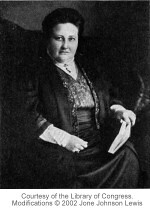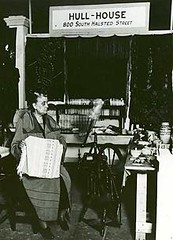Amy Lowell
Amy Lowell, from whom the term âAmyigismâ came as a quip by Ezra Pound, had quite an interesting life. She was one of the Lowell Mills heiresses. (The Lowell family owned a vast number of textile mills in Massachusetts which gained them extreme wealth and power---two cities were named for the family!) She called herself âa businesswomen who decided to become a poetâ. Coincidentally, she was more remembered for her familyâs legacy than her poetry until somewhat recently. Her works were rediscovered when literary scholars began to look back at older works and tried to find same sex relationships in literature. Amy Lowell was never openly a lesbian, but she never married and for a considerable part of her adult life traveled and lived with a female companion named Ada Dwyer Russell to whom Amy wrote poetry containing erotic images. Although Amy took her writing seriously, other imagist poets sometimes made jokes about her work and physical appearance (Ezra Pound called her a hippopoetess). She, however, took the imagist movement to heart and sometimes went so far as to finically support other writers in the movement who were unable to support themselves. Lowell died in 1925 and was remembered for her writing, her extreme eccentric nature and her familyâs legacy. Her works contain erotic/ suggestive images set in free verse, and others set in what she called âpolyphonic proseâ.



